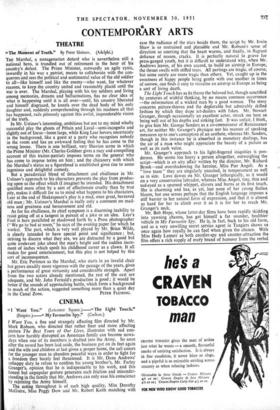CONTEMPORARY ARTS
THEATRE
"The Moment of Truth." By Peter Ustinov. (AdelphL) THE Marshal, a nonagenarian dotard who is nevertheless still a national hero, is trundled out of retirement in the hour of his country's defeat. The Prime Minister, outwardly an agile cynic, inwardly in his way a patriot, means to collaborate with the con- querors and sees the political and sentimental value of the old soldier to all—like himself and like the enemy—who want, for whatever reasons, to keep the country united and reasonably placid until. the War is over. The Marshal, playing with his toy soldiers and living among memories, dreams and hallucinations, has no clear idea of what is happening until it is all over—until, his country liberated and himself disgraced, he kneels over the dead body -of his only daughter and, suddenly comprehending through his madness all that has happened, rails piteously against this awful, imponderable vision of the truth.
In Mr. Ustinov's interesting, ambitious but not to my mind wholly successful play the ghosts of Petain and Laval—semi-incognito and slightly out of focus—loom large, while King Lear hovers uncertainly in the background, like a guest at a party who recognises nobody in the room and has an awkward feeling that he has come to the wrong house. There is one brilliant, very Shavian scene in which the Prime Minister (Mr. Charles Goldner gives a racy and compelling account of this traitor-patriot) imposes terms on the general who has come to impose terms on him ; and the chicanery with which the Marshal's status as a figurehead is established gives rise to some ingenious and delightful comedy.
But a paradoxical blend of detachment and ebullience in Mr. Ustinov's approach to his characters prevents the play from produc- ing upon us the effect which (I imagine) he intended. His detachment qualified more often by a sort of affectionate cruelty than by true pity, makes it difficult for us to mind what happens to his characters. Lear at the end of Shakespeare's play is a mad, once great, bereaved old man ;"Mr. Ustinov's Marshal is really only a comment on mad- ness and greatness and bereavement and eld.
As for his ebullience, its chief symptom is a disarming inability to resist going off at a tangent in pursuit of a joke or an idea. Lear's Fool is here paralleled or shadowed forth by a Press photographer (" We go to bed at noon," he says of the evening paper for which he works). The part, which is very well played by Mr. Brian Wilde, is clearly intended to have special point and significance; but, striving to discern what they are, we are distracted by a good but quite irrelevant joke about the man's height and the sudden incre- ment of inches which spoilt his childhood career as a clown. It all makes for good entertainment, but this play is not helped by this sort of inconsequence.
Mr. Eric Portman as the Marshal, who starts in an invalid chair but grows steadily more vigorous with the passage of the years, gives a performance of great virtuosity and considerable strength. Apart from the two actors already mentioned, the rest of the cast are adequate, and Mr. John Fernald's production is good ; it would be better if the sounds of approaching battle, which form a background to much of the action, suggested something more than a quiet day


































 Previous page
Previous page